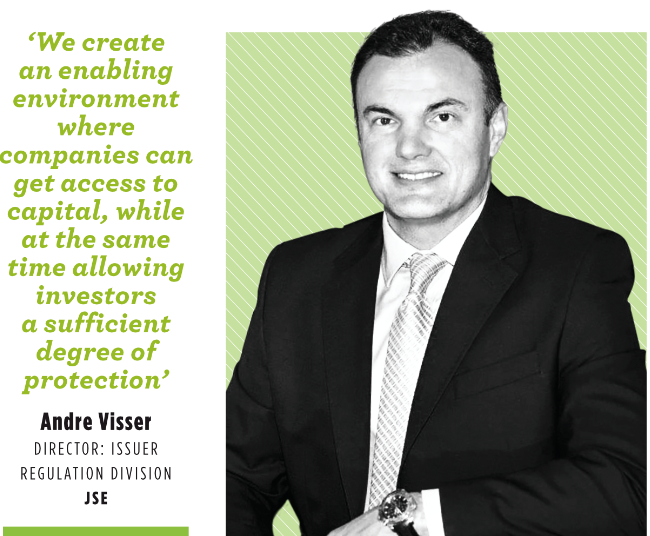Through the course of normal operations, the JSE updates the market on new processes and regulations. In any given year, there will be about a dozen of these announcements. In 2018, there were 10. In 2019, there were 12. In 2020, there were 24 … by June.
‘That’s unprecedented,’ says Andre Visser, Director of the Issuer Regulation Division at the JSE. As the front-line regulator, the JSE sets and enforces listings requirements. Yet, as Visser emphasises, its main role is that of enabler.
‘We create an enabling environment where companies can – in a fair, transparent and efficient manner – get access to capital, while at the same time allowing investors a sufficient degree of protection. Everything we’ve done over the past few months has focused on that: allowing issuers to have access to the capital markets as opposed to looking for ways to block them at every corner.’
Yet a balance must be struck – and that’s what makes the role of the Issuer Regulation Division so important. ‘There needs to be an environment where companies can raise capital quickly and efficiently, while investors can still exercise their rights to make informed investment decisions and vote on important matters that affect their rights,’ says Visser.
Pull too far in one direction, and you dilute shareholders’ rights. Pull too far in the other, and you make it all but impossible for companies to run their business. ‘It’s a balance,’ he says. ‘In many cases, we serve two constituents: issuers and investors. Investors ask us to be more stringent, and issuers ask us to be much more lenient. We generally tell ourselves that if both issuers and investors are upset with us, then we’re probably getting it right.’
That’s obviously said tongue-in-cheek, but it shows just how delicate the balance is, especially during extraordinary times such as these. The circumstances around the COVID-19 crisis – ever challenging, ever changing – means the JSE’s Issuer Regulation Division has had to be pragmatic in its role as an industry regulator.
‘We have a set of rules and we apply them consistently to all companies on an equal basis,’ says Visser. ‘And 99% of the time it works perfectly – until you’re hit with COVID-19. This is an unprecedented set of circumstances, and the traditional regulatory framework is not designed to deal with it.’
For example, one of the JSE’s listing requirements is that companies publish regular financial statements. ‘In the early stages of the lockdown, some companies couldn’t allow the traditional, substantive audit process because their auditors weren’t allowed to travel to their offices or be on their premises to do stock counts,’ he says.
‘Under our existing framework, if you don’t produce your results on time, we have to consider suspending your listing. So here we’re faced with a situation where companies may have to issue results that were possibly not audited, or where they did not have the proper time to consider the long-term implications of their circumstances.
‘We realised very quickly that our regulatory framework wasn’t designed for this, so we needed to think innovatively and look at other options that would give those companies some sort of time relief to properly consider the impact on their business.’
The result was one of those 24 announcements of early 2020, in which the Financial Sector Conduct Authority granted listed companies an additional two months to publish their financial results. Throughout the process, the JSE proactively engaged with issuers and sponsors, and sought to – as Visser puts it – play a more pragmatic and innovative role than what regulators traditionally play.
‘Regulators are typically reactive,’ he says. ‘Something goes wrong, and the regulator reacts. We’ve been engaging with stakeholders in the market, anticipating the things that were coming the way of our listed companies so that they can get the necessary relief.’









